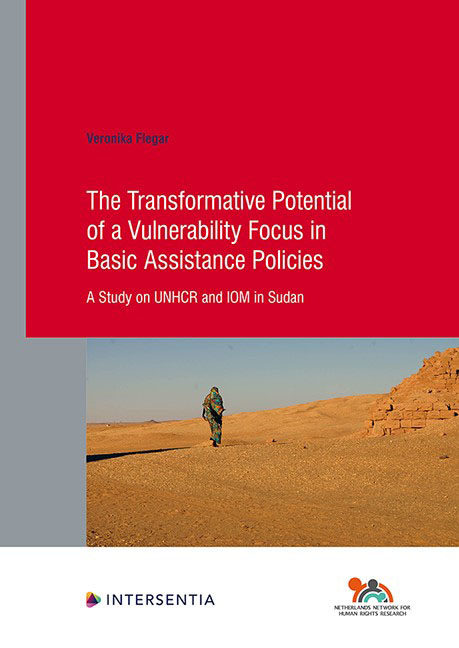 The Transformative Potential of a Vulnerability Focus in Basic Assistance Policies
The Transformative Potential of a Vulnerability Focus in Basic Assistance Policies Published online by Cambridge University Press: 11 November 2021
This chapter presents this case study’s findings regarding the design of the vulnerability assessments for basic assistance at IOM’s MRRC in Khartoum. The chapter starts by describing the specifics of the vulnerability assessments themselves (11.1), subsequently outlines which administrative dilemmas respondents have struggled with when designing the vulnerability assessment (11.2), then highlights the contextual constraints perceived as relevant by respondents involved in the design of the vulnerability assessments (11.3) and ends with a short summary in the form of concluding remarks (11.4).
The findings presented in this chapter largely rely on semi-structured interviews with the four IOM employees that were or had been directly involved in the design and coordination of the vulnerability-focused basic assistance policy at IOM’s MRRC in Khartoum. This includes all the relevant persons who were still working at IOM Khartoum at the time of my field research. If the interview transcripts contained gaps on relevant information that I had come across during participant observation, I integrated this information through field note references. I attempted to present as much raw data as possible without making the text unreadable. Where quotes were relevant to several themes or concepts I merely used the quote once (usually where I found it to be most relevant) and subsequently referred to it in a footnote in other sections where the quote could equally have served to illustrate a certain point.
The personal/professional characteristics of the respondents did not appear to be particularly relevant for the findings presented below. As such, all respondents held similar coordination positions. Two respondents were men and two respondents were women. Two respondents were national staffand two respondents were international staff. Although the shared reference frame, background and English language capacity made it easier for me to receive useful and precise information from international staff, I found that, after more than one year of living and researching in Sudan, I was able to frame my questions to national staffin a way that allowed for a similar level of mutual understanding. This mitigated the impact of any possible divergences in this respect.
To save this book to your Kindle, first ensure [email protected] is added to your Approved Personal Document E-mail List under your Personal Document Settings on the Manage Your Content and Devices page of your Amazon account. Then enter the ‘name’ part of your Kindle email address below. Find out more about saving to your Kindle.
Note you can select to save to either the @free.kindle.com or @kindle.com variations. ‘@free.kindle.com’ emails are free but can only be saved to your device when it is connected to wi-fi. ‘@kindle.com’ emails can be delivered even when you are not connected to wi-fi, but note that service fees apply.
Find out more about the Kindle Personal Document Service.
To save content items to your account, please confirm that you agree to abide by our usage policies. If this is the first time you use this feature, you will be asked to authorise Cambridge Core to connect with your account. Find out more about saving content to Dropbox.
To save content items to your account, please confirm that you agree to abide by our usage policies. If this is the first time you use this feature, you will be asked to authorise Cambridge Core to connect with your account. Find out more about saving content to Google Drive.